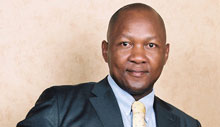
Are Cell C, Dimension Data and Andile Ngcaba’s investment firm Convergence Partners planning to build a national fibre-optic telecommunications network?
Rumours have begun circulating that the three companies are in talks about doing exactly that. TechCentral has established from various parties that preliminary talks are already underway.
Convergence Partners, which is already an investor in the undersea Seacom cable system, appears to have initiated talks with a number of parties, including Didata and Cell C, about creating a consortium to build a national backhaul telecoms network on “open access” principles.
If the talks come to fruition, they could shake up the country’s telecoms landscape.
Convergence Partners is believed to be flush with cash from its recent sale of its stake in Telkom. And Didata is in the process of being acquired by Japanese telecoms giant Nippon Telegraph and Telephone (NTT) Corp. NTT is one of the world’s largest telecoms carriers.
Convergence Partners is understood to be toying with the idea of building fibre infrastructure to take on incumbent Telkom’s national backhaul network and similar networks being built by Vodacom, MTN and Neotel.
Most of the parties involved in the talks are not prepared to comment, and TechCentral understands the discussions are still very much at a preliminary stage.
Derek Wilcocks, MD of Didata division Internet Solutions, confirms that Convergence Partners has initiated talks “to see how it can reduce the cost of national bandwidth”.
“Convergence Partners has sent a letter to a number of potential big purchasers of bandwidth,” he says.
“Internet Solutions is very interested in any initiative that can deliver a lot more bandwidth at a lower price [but] we haven’t committed to anything as yet.”
Ngcaba didn’t return messages left with his personal assistant; Didata SA CEO Allan Cawood declines to comment; and all Cell C CEO Lars Reichelt will say is the mobile operator will be able to provide details only once negotiations have progressed further.
Cell C, which is building a third-generation (3G) mobile network at a cost of about R5bn, is keen to get access to fibre infrastructure to provide backhaul connectivity to its base stations.
Reichelt first alluded to talks at a media conference last week where he said Cell C was involved in discussions with a consortium of companies about building a national fibre network to provide backhaul connectivity to its base stations.
“We have secured sufficient fibre to roll out our network in the interim, but that capacity will be very expensive and we will run out of capacity in 18 months,” he said.
Cell C is building a national 3G mobile network as it tries to improve its position in a market that is dominated by incumbents Vodacom and MTN. — Duncan McLeod, TechCentral
- Subscribe to our free daily newsletter
- Follow us on Twitter or on Facebook




